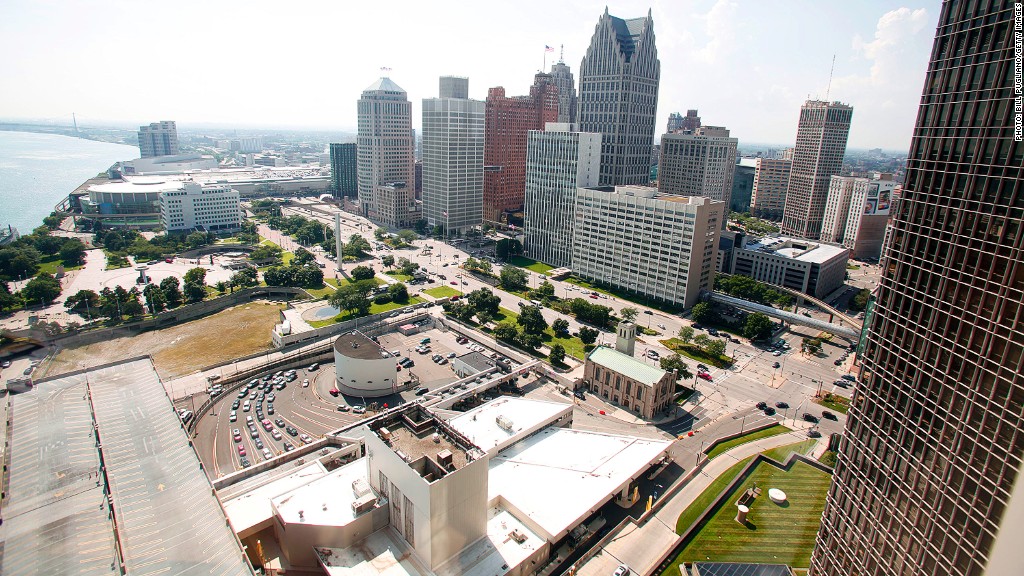
Hedge funds have their eyes fixed on Detroit.
Detroit's bonds have become the hottest trade on Wall Street, since the Motor City filed for the largest municipal bankruptcy two weeks ago.
Prior to the bankruptcy filing, Detroit's emergency manager, Kevyn Orr, offered to pay bondholders roughly 10 cents on the dollar to help keep the city going.
That would result in huge losses for the city's original creditors. But hedge funds, particularly those that invest in troubled or bankrupt companies, think these bonds will turn out to be lucrative in the long run.
The problem is there aren't that many available. Few have traded, and the waiting lists are long.
Related: Detroit: After bankruptcy, then what?
"The biggest problem we have is how to allocate bonds," said a trader on a major bank's municipal desk. "Only major customers are getting the opportunity to buy."
Detroit has $18 billion of liabilities, but only about $8.2 billion in bonds you can trade. The rest of the city's liabilities are tied to unfunded pensions and retirees' healthcare costs.
Of the bonds, there are $1.4 billion that have funded some of Detroit's pension costs, and those are among the most coveted by hedge funds.
These taxable bonds, known as pension obligation certificates, were issued and sold to European banks in 2005 to help fund the city's pensions. It was an unusual move by Detroit, because cities typically use local revenue to fund these obligations.
Now, hedge funds are just waiting for the banks to sell. Given Detroit's financial mess, that could happen in the next month or so as banks get skittish about keeping that debt on their books, several market experts say.
Many funds are willing to buy small amounts just to get their foot in the door.
Shortly after Detroit filed for bankruptcy, several hedge funds managed to buy $5 million of pension bonds for 41 cents on the dollar. Those were some of the only pension obligation bonds available.
Related: Michigan court clears way for Detroit bankruptcy to proceed
Hedge funds are also eyeing about $1 billion in general obligation bonds backed by Detroit. More of these have changed hands, but also in small increments. One hedge fund manager said he was able to procure $30,000 of general obligation bonds at 75 cents on the dollar from a dentist in Milwaukee. The fund was hoping to buy several millions of dollars' worth, but so far, that's all they can get their hands on.
Most of Detroit's general obligation bonds are owned by retail investors. Since the bankruptcy, these bonds have been selling at between 69 cents and 92 cents on the dollar.
While Detroit's full faith and credit seems questionable right now, the city's bonds are backed by insurance firms, including Ambac (AMBC), Assured Guaranty (AGO) and the national finance arm of MBIA (MBI). Some investors are betting that these insurers will continue to pay Detroit's bondholders for now.
Other bondholders think Orr's initial projection for what they could recover was overly pessimistic. There's some speculation that he overstated the unfunded pension liabilities. Some hedge fund managers also think a portion of healthcare costs for Detroit's city workers will be able to be deferred under Obamacare.
Betting on Detroit's bonds is still a big gamble. There have been few municipal bankruptcies in the United States, and most have been small.
Still, Jim Spiotto, a partner at law firm Chapman and Cutler and a veteran of several municipal bankruptcies, said that overall, bondholders have recovered more in municipal bankruptcies than corporate ones.
But he cautioned investors should be wary of Detroit, because it might not follow suit. "Detroit has a long history of disappointing people. Detroit could very well be an aberration from other municipal bankruptcies."


